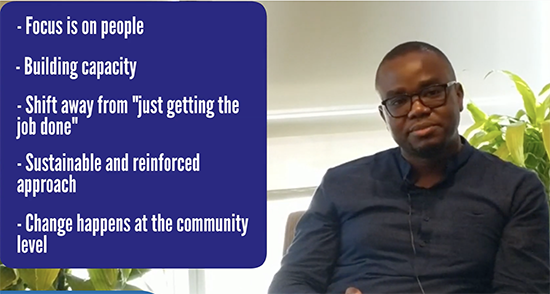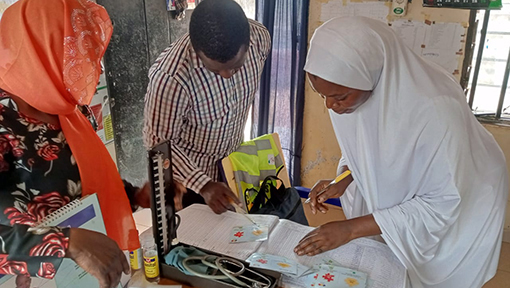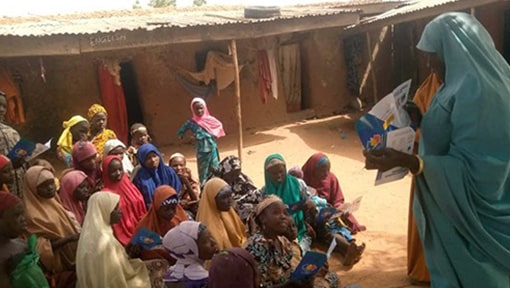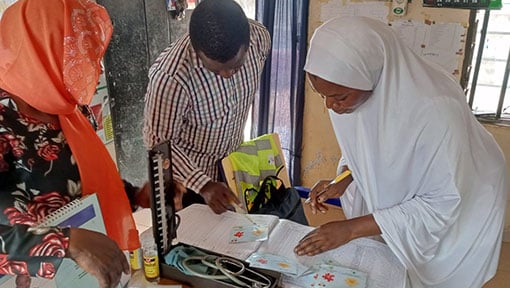The Transformational Power of TCI Coaching: Lessons from the Nigeria Experience
Contributors: Victor Igharo, Lekan Ajijola, Nneoma Anieto, Rabi Ekele, Sarah Brittingham and Liz Tully
A key characteristic that sets The Challenge Initiative (TCI) apart from other health and development programs is its focus on coaching for capacity transfer. TCI’s coaching model aligns with its distinct demand-driven approach, which emphasizes local investment and decision-making and promotes local ownership while strengthening capacity and sustainability. TCI’s coaching approach believes that individuals and teams are capable of generating their own solutions, with the coach supplying supportive, experience-based and discovery-based approaches and frameworks.
TCI’s coaching approach centers on helping others expand their view: to shift from seeing only problems that need to be ‘solved,’ to recognizing that opportunity is often disguised as obstacles. As a result, TCI has adopted a “Lead, Assist, Observe” coaching model, supported by its online learning platform TCI University, to strengthen individuals’ capacity and create organizational and system-level changes by activating and strengthening existing structures and systems to design, implement and monitor TCI proven approaches.
We define coaching as:
A structured, yet flexible process by which coachees are empowered to make positive changes in their internal motivation, knowledge, skills, and ability to address needs, solve problems, take on new challenges, improve individual performance, and achieve individual, team and organizational objectives.
TCI trained coaches walk hand-in-hand with cities as they examine their data to determine their most pressing reproductive health needs, adapt proven approaches to meet them and then implement and monitor accordingly. The coaching process is designed to be flexible, accounting for factors in the local context including:
- Needs of the individual coachee(s) and/or teams being coached;
- Coachee’s existing knowledge, skills and confidence in identifying, adapting and applying solutions;
- Specific complexities of the challenge, task(s) or problems at hand
Although TCI’s coaching approach is tailored per the specific need and context, seven key characteristics have been found to be critical in ensuring an effective coach-coachee relationship:
The 7 Cs (or Characteristics) of an Effective TCI Coach:
- Technical knowledge about the evidence-based approaches
- Listening skills to empathize and identify needs
- Communication skills to explain complex ideas in simple terms
- Ability to follow-up and give constructive feedback
- Flexibility and openness to any situation
- Using data to select and adapt evidence-based approaches
- Willingness to learn and keep up-to-date with current developments
TCI’s coaching approach has been adapted by its four regional hubs to ensure that it is right-sized for the context in which they work.
The Johns Hopkins Center for Communication Programs implements TCI in Nigeria, where coaching centers around engaging all state counterparts –not just those within TCI-sponsored local government areas (LGAs) – as well as working with existing community structures to ensure state ownership, adaptation and sustainability of the proven approaches. Within the embedded coaching and technical assistance (TA) structure, a TCI State Program Coordinator (SPC) and Technical Support Leads (TSLs) are co-located with government staff in their respective units. This allows for day-to-day mentoring of not just individual state-level employees but capacity strengthening of existing state and LGA platforms with the ultimate goal of strengthening the primary health care (PHC) system.
This approach institutionalizes local capacity transfer to lower levels – from State coordinators to LGA coordinators and supervisors. It follows the “Lead, Assist, Observe” coaching model, highlighting specific attributes related to the Nigerian context.

LEAD
Hands-on TA approach of demonstrating feasibility of the model while building the capacity of managers and implementers.
- Designed by states with support from TCI; often driven by TCI
- TCI as primary funding source, with government exploring other leveraged funding sources
- Develop or renew the FP strategic plans (CIP)
- Establish and/or strengthen (existing) platforms (SBCC Committee, QITs, etc.)
- Establish and strengthen accountability mechanisms such as the Advocacy Core Group (ACG)

ASSIST
State leads implementation, while TCI supports through coaching, mentoring and supporting from behind
- Increased government funding (allocation and release) and other leveraged funding sources
- State-led coordination mechanisms like Technical Working Groups
- FP program integration within the RMNCH+N continuum
- Systems strengthening through coordination platforms, FP strategic plans (CIP), and harmonized FP workplans
- Improved quality of data reporting systems

OBSERVE
Demonstrate state’s commitment to lead, coordinated, results-oriented and cost-effective implementation
- Majority funding comes from states, with other leveraged funding mobilized from various sources
- Minimal stockouts and zero out-of-pocket expenditures for consumables by clients
- Family planning is openly discussed by religious, traditional, political leaders, media and community/social groups
- Regular, ongoing use of quality data to inform and monitor harmonized family planning workplans
In this series of videos, Victor Igharo, Chief of Party for TCI Nigeria, shares some words of wisdom about key coaching tips learned from the Nigerian experience implementing TCI.
TCI’s coaching approach is ensuring a lasting impact by improving resource mobilization for family planning and adolescent and youth sexual and reproductive health programming, implementation of proven approaches and improvements in quality data reporting and use for decision-making. To learn more about TCI Nigeria’s coaching support, check out TCI Nigeria Coaching and Technical Assistance Framework.
Transforming the Family Planning Landscape in Bauchi State
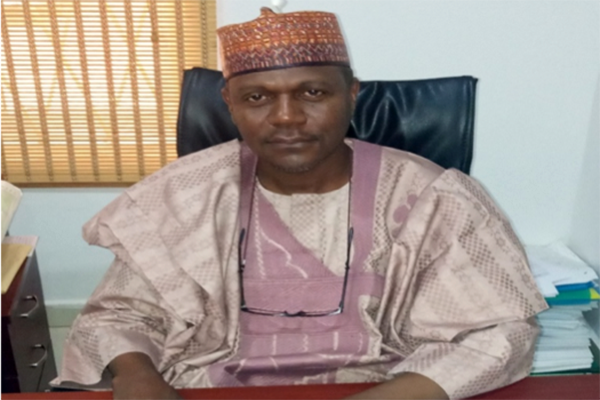
Ibrahim Gamawa is the former Executive Chairman of the Bauchi State Primary Healthcare Development Agency.
“Since the inception of TCI in Bauchi State, we have seen tremendous changes especially in the child birth spacing landscape in the state. And, one thing that we noticed about TCI that is different from other projects is that the office is embedded inside the agency. In fact, they are like staff of the agency, and so collaborating with the staff of the agency in order to provide technical support needed is within the same environment, which is very significant. Another thing is the 72-hour makeover, something like an “impossibility” happening, we normally go through contract signing, bidding, etcetera at much higher rates, but what we are seeing with TCI is beyond imagination. Something that is done within a twinkle of an eye: You close on Friday and come to work on Monday and see that the same place you left on Friday has been completely transformed. And, what makes this super awesome is the way local artisans are used to provide labor at low or not cost sometimes. Because of that transformation, the clients feel more at home to come to access service, even the service providers are happy to provide services to clients in a more conducive environment. TCI focuses on urban slums because that is where the population explosion is happening, and when you can make those areas to have quality and friendly services, you will reach more people than even anticipated. Indeed, we are seeing a lot of changes and we are going to scale up these great approaches to improving access and quality.”
Building Capacity for Improved Quality Data Collection
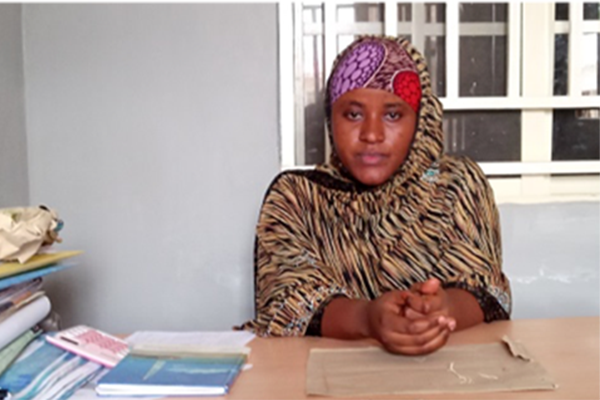
Sumaiyyah Suleiman is a Family Planning M&E Officer in Bauchi State.
“I work with Bauchi State Primary Healthcare Development Agency (BSPHCDA) as a Data Processing Officer since 2013. Before the coming of TCI, as a data officer, I did not know a lot of thing, like how the DHIS works, for example. I was collating data for only one local government area, until when I started working as a state counterpart to TCI M&E. My capacity has now been built not only on how to log into the DHIS platform but how to download data, analyze and compare it to see the differences and improvements. Not only that, my capacity has been strengthened that I collate monthly data from health facilities and conduct Data Quality Assessment (DQA) and share it with implementing partners. It wasn’t like this before the coming of TCI. I feel very confident now in my role as M&E Officer of the Family Planning Unit in the PHC Agency.”
See more about Data Quality Assessment in TCI University.

